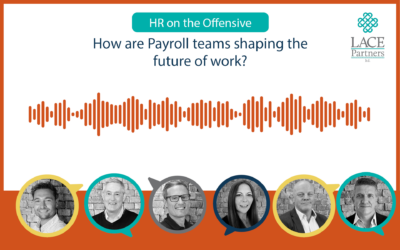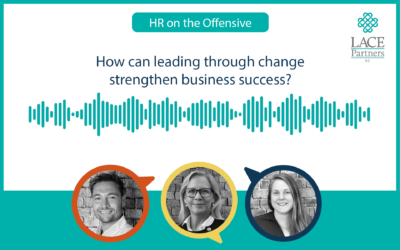At LACE, we are passionate about equity in the workplace. Reflecting on this International Women’s Day theme of #AcceleratingAction, we asked a few of our team to share their experiences of the workplace and their view on what can be done to improve gender parity at work and beyond.
Q: What do you think is the biggest challenge women face at work that organisations should be aware of?

Emma Taylor – Sales Executive Director
One of the biggest challenges women face is unconscious or subconscious bias around female behaviours and societal norms. It’s not just a male issue, women do this to other women too.
Women are labelled aggressive, where men are admired for being assertive as the most quoted example. Societal norms work against women causing tension and friction. The trickiest part is that people don’t even know they do it.
Try questioning your use of certain words; are they reinforcing a female stereotype or reflecting on whether you are reacting subconsciously to a bias? The premise of the traits of femininity – nurturing, sweet, sensitive, warm, modest, gentle are deeply rooted in misogyny, sexism and the patriarchy – pause and think about how your perception is being influenced by that unconscious expectation of what it is to be feminine, are you judging someone on social expectations and mentally chastising them?
It takes practice: I try and call out language in the moment or afterwards one-to-one if more appropriate, if we spot it, we should challenge it, silence is compliance after all and shifts in language shift perceptions greatly.
Q: What advice would you give your younger self entering the workplace?

Becky Lovelady – Manager
I would tell my younger self that it’s going to take time to build your confidence and feel able to speak up, but that’s ok – be patient, listen and learn until you’re ready to make your voice heard. And don’t apologise for having an opinion!
You’ve earned the right to participate, and you’re adding just as much value to the conversation as the more experienced men in the room who speak with so much conviction. Don’t be afraid to challenge behaviour that you don’t think is appropriate or fair (and always correct gendered words that don’t need to be gendered, even if it annoys people…) – you won’t always change their minds straight away, but it might make them think next time. Finally, don’t let anyone make you feel small or weak if you get emotional in work situations – it just means that you care.

Martina Salander – Senior Manager
Don’t be afraid to try new things! Not everything has to be figured out in your early 20s. When I graduated college, I embarked on a management trainee programme. I was eager to specialise but my mentor at the time challenged me to work across lots of different projects and teams. At the time I remember feeling a bit impatient but now I am so grateful for the opportunity to get exposure across a wide range of areas before specialising.
At LACE we have some great role models in the organisation who have shown that you don’t need to choose between pursuing a career and having a family. While consulting can be an industry in which time is challenged, at LACE there is flexibility and understanding in the team to help manage your professional and personal pursuits.
Q: What three things can organisations change to #AccelerateAction in the workplace?

Rong Ye – People Adviser
1. Implement and strengthen inclusive policies: It is important that organisations review and enhance their policies that support gender equity, such as enhanced parental leave , flexible working, equal pay transparency, and robust anti-discrimination measures ensure that women- and all employees have the support they need to thrive. Without these policies, structural barriers persist, which makes it harder for women to balance career progression with personal responsibilities. A policy driven approach ensures that inclusion isn’t just a goal but a standard practice embedded into the organisation.
2. Increase representation and leadership opportunities: Representation matters – when women see role models in leadership positions, it fosters aspiration and confidence in their own career paths. Therefore, a lack of diversity in the leadership positions can create unconscious biases in hiring, promotions and decision-making. By setting clear diversity targets, offering mentorship programs, organisations can cultivate a leadership pipeline that reflects the diversity of their workforce. Equitable leadership isn’t just about fairness- it leads to better decision-making, innovation, and overall business success.
3. Fostering a culture of accountability: Policies and representation alone are not enough. Culture drives long-term change. It is important to have a workplace where employees are actively challenging biases, supporting diverse colleagues and hold leadership accountable. This will then create an environment where women can truly thrive. This means providing unconscious bias training and establishing safe spaces for open discussions.
Q: What are some initiatives or policies that you believe are crucial for fostering an inclusive and empowering workplace for women?

Gemma Ryall – Senior Manager
Below are the five initiatives and policies that I feel are key for creating truly inclusive and empowering workplaces for women. During my time in the workplace I have benefited from all of these elements:
- Comprehensive equal pay practices including regular audits, transparent salary bands, and policies prohibiting salary history questions that can perpetuate existing wage gaps. Ensuring leaders pay people for their worth no matter their gender or background.
- Flexible work arrangements that accommodate caregiving responsibilities such as remote work options, flexible hours, and parental leave for all parents. By breaking down barriers to men taking parental leaves for longer periods and taking up flexible working supports to make a more balanced parenting approach and support women in the workplace.
- Inclusive benefits that address women’s specific needs, including comprehensive reproductive healthcare, childcare assistance, and menopause support.
- Regular training on unconscious bias, allyship, and inclusive behaviours for all employees, with special emphasis on managers who make key decisions about hiring and advancement.
- Support for networking, mentorship, and employee resource groups that provide community and advocacy
Q: How these came to play out for you?
Parental leave and flexible working: As I was about to go on maternity leave with my first child my boss called me in and asked if I would like an opportunity to take an interim role as EMEA HRD; the catch was that I would need to take only six months maternity leave in order to take up the opportunity.
As a first-time parent and without family nearby this meant that my daughter would have gone to nursery at six months old and it was something I felt uneasy about. At the time, new policies had just come in place around split maternity leave, but my husband’s organisation was too small to be able to support this. Creating the option for parents to share maternity leave is making a shift to allow women and men to take time out for their families.
Support in networking, mentoring and coaching: The organisation I worked in had both leadership coaching and parental leave coaches. This meant that I was supported through big life events with career decisions and life decisions.
Q: Why would you say LACE is a good place for women to work?

Abi East – People and Workplace Executive Director
LACE is 70% female and the vast majority of our leaders are female. There are no glass ceilings here!
Our culture is supportive and inclusive our people managers invest time in getting to know their teams, building trust so that our employees feel able to bring their whole selves to work. One of our three values is care and that is a consistent theme that underpins how we work with our colleagues our clients. Our employees genuinely feel cared about and that makes LACE a special place to be.
Q: What change can organisations make to #AccelerateAction?
Colin Goodwin – Director
Acknowledging the value that women bring to senior roles. Women make up 51% of the population but occupy only 42% of seats at UK FTSE companies, and less than 31% in NYSE and DAX companies.
Q: What are some crucial initiatives or policies for fostering an inclusive and empowering workplace for women?
Flexible working and work/life balance. Also, some companies for example have achieved a lot by phasing out promotions and moving to all roles having to be advertised competitively and openly within the organisation so everyone had an equal chance of career progression.
Q: What’s the top challenge you think women face at work that organisations should know about?

Saranya Batra – Analyst
In my opinion, the biggest challenge women face in the workplace today is the constant juggling of multiple roles—balancing their professional careers alongside caregiving responsibilities, household management, and often the invisible emotional labour (referring to concepts like mom guilt and women resuming natural responsibility of the home and its people) that comes with these roles.
Despite this, women frequently do not receive the same recognition, opportunities, or pay as their male counterparts. Research shows that women in the UK still earn 14.3% less than men on average (ONS, 2023), and only 10% of executive roles in the FTSE 100 are held by women (Hampton-Alexander Review, 2023), despite making up nearly 50% of the workforce.
One of the biggest barriers to progress is the rigidity of organisational policies. Many workplaces still operate with outdated structures that do not accommodate the reality of modern working life—especially for those with caregiving responsibilities. Without flexible working hours, remote work options, and parental support policies, women are often left at a disadvantage when it comes to career progression.
In fact, 43% of women consider leaving their jobs after having children due to a lack of flexibility, compared to only 23% of men (CIPD, 2023). I know if these flexible work policies existed a few years ago, my mum would have continued working full time instead of switching to part time to take care of me!
Q: How can organisations #AccelerateAction?
To drive real change, businesses must implement accelerators such as understanding, empathy, and equitable workplace policies. Studies show that companies with strong DEI initiatives outperform those without, reporting up to 35% higher financial returns (McKinsey, 2023). Women and men should be given equal opportunities for leadership roles, pay raises, and promotions, ensuring that talent—not gender—determines career progression.
At LACE, we are committed to creating a workplace where women can thrive, grow, and succeed—regardless of external responsibilities. Our flexible work policies, inclusive culture, and talent-first approach ensure that all employees are valued for their contributions.







